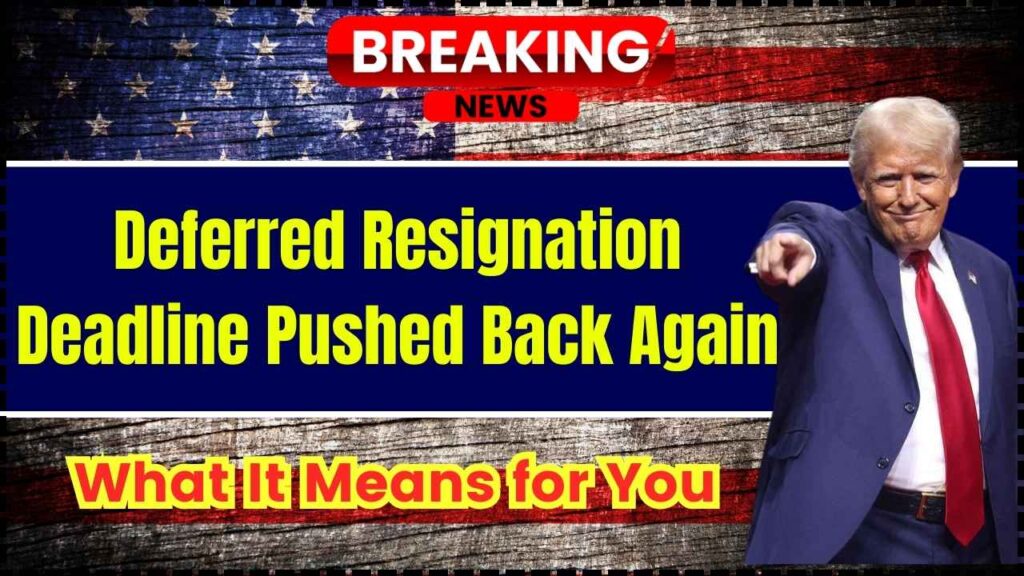Deferred Resignation Deadline Pushed Back Again: The deferred resignation program, introduced as a federal workforce reduction initiative, has faced multiple legal challenges, leading to another extension of its deadline. Initially designed to allow voluntary resignations with continued pay and benefits until September 30, 2025, the program has now been halted due to court rulings, creating uncertainty for federal employees. This article explores the current status of the deferred resignation program, eligibility criteria, legal challenges, and what employees should do next.
Deferred Resignation Deadline Pushed Back Again
The deferred resignation program was meant to give federal employees a voluntary exit option with financial stability. However, legal battles have put the program on hold, leaving employees in uncertainty. As the situation unfolds, staying informed, seeking professional guidance, and preparing financially are the best steps for affected employees. For official updates, visit: OPM Deferred Resignation Program.

| Key Information | Details |
|---|---|
| Program Name | Deferred Resignation Program (“Fork in the Road”) |
| Initiation Date | January 28, 2025 |
| Original Acceptance Deadline | February 6, 2025 |
| Extended Deadline | Indefinitely postponed pending legal review |
| Offer Details | Voluntary resignation with pay and benefits through September 30, 2025 |
| Legal Challenges | Alleged violations of the Administrative Procedure Act and Antideficiency Act |
| Current Status | Program implementation paused by federal court |
Source: Office of Personnel Management
Understanding the Deferred Resignation Deadline
The Office of Personnel Management (OPM) launched the deferred resignation program as part of an effort to streamline the federal workforce. Employees who opted into the program would resign voluntarily but continue receiving full salary and benefits until the end of September 2025.
Who is Eligible?
- Federal civilian employees, except for:
- Military personnel.
- U.S. Postal Service workers.
- National security and immigration enforcement officers.
How the Program Works?
- Employees must send an email with the subject line “Resign” from their official government email.
- Once accepted, employees are placed on administrative leave while continuing to receive salary and benefits.
For official details, visit: OPM Deferred Resignation.
Legal Challenges and Court Interventions
The program quickly faced legal opposition from federal employee unions and lawmakers, leading to a series of court rulings.
Key Legal Concerns
- Violations of the Administrative Procedure Act – Critics argue that the program was introduced without proper rulemaking procedures.
- Potential Breach of the Antideficiency Act – Legal experts question whether the government can continue paying employees who are no longer working.
Timeline of Court Actions
- February 6, 2025 – A temporary restraining order was issued by a federal court, pausing the program and extending the deadline to February 10, 2025.
- February 10, 2025 – The restraining order was extended indefinitely, effectively suspending the program.
These legal battles have left federal employees in limbo, unsure whether the program will resume.
Impact on Federal Employees
1. Decision-Making Uncertainty
Many employees had planned their financial and career moves based on the original resignation deadline. The indefinite suspension now forces them to reconsider their options.
2. Potential Workforce Reduction Plans
If the government intends to cut workforce costs, alternative measures such as mandatory layoffs or hiring freezes may be considered.
3. Financial Planning Considerations
Employees who resigned early now face uncertainty about their benefits and whether the government will reinstate their employment.
Reactions from Federal Employee Unions and Lawmakers
Union Responses
Several federal employee unions have strongly opposed the program, calling it a coercive attempt to shrink the workforce.
- American Federation of Government Employees (AFGE): “This program is a disguised workforce reduction plan that lacks proper legal authorization.”
- National Treasury Employees Union (NTEU): “Federal employees deserve transparency and respect, not rushed decisions with unclear consequences.”
Lawmakers’ Opinions
- Supporters: Argue that the program helps reduce government spending.
- Opponents: Say it violates employee rights and lacks proper legislative approval.
What Happens Next? Possible Outcomes of the Legal Challenge
Several possible scenarios could unfold:
- Court Overturns the Program – If ruled illegal, affected employees may need alternative options for voluntary separation.
- Program Resumes with Modifications – The government may introduce adjustments to eligibility or offer partial salary continuance instead of full benefits.
- Congress Intervenes – Lawmakers may pass legislation to either formalize or cancel the program.
Employees should prepare for all three possibilities.
Practical Advice for Affected Employees
If you are affected by the deferred resignation program, consider the following steps:
1. Stay Informed
- Check updates from OPM.
- Follow official federal employee union announcements.
2. Consult Legal and HR Experts
- Seek guidance from agency HR departments.
- Speak to federal employment attorneys if needed.
3. Review Financial Plans
- If you planned to resign, consider alternative savings or benefits.
- Avoid making major financial commitments until the program’s fate is clear.
Trump Deferred Resignation Program 2025 – Pros, Cons, and How It Can Benefit You!
Trump Signs Laken Riley Act into Law – Who will get benefit from this? Check in Detail
Social Security Delays Retroactive Payments for Public Workers – What This Means for You!
Frequently Asked Questions (FAQs)
1. Is the deferred resignation program still active?
No, the program is paused indefinitely due to legal challenges.
2. What happens if I already accepted the resignation offer?
The government has not provided clear guidance. Employees in this situation should contact OPM or their HR departments.
3. Can the program be reinstated?
Possibly. The government may appeal the ruling, or Congress may intervene.
4. What other options exist for voluntary separation?
Some agencies may offer early retirement incentives or voluntary buyout programs.
5. Where can I find the latest updates?
Visit OPM’s official website and follow trusted news sources.







